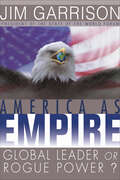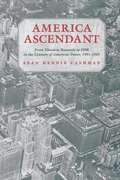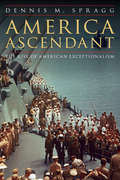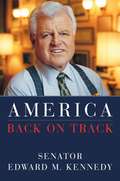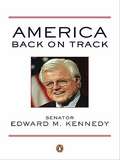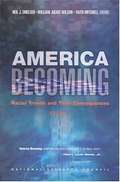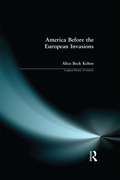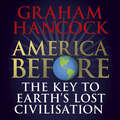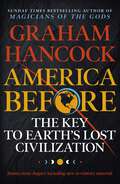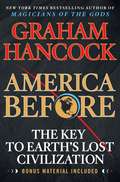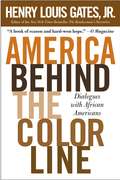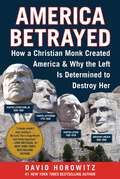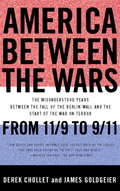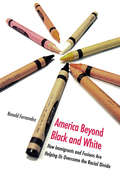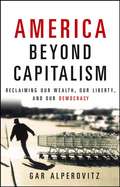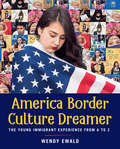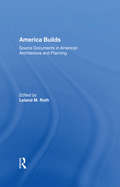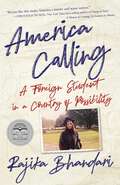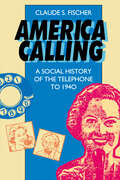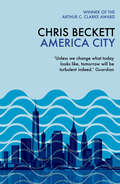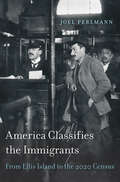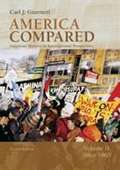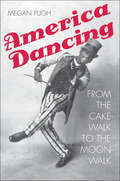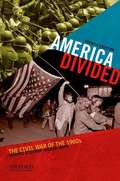- Table View
- List View
America As Empire: Global Leader or Rogue Power?
by James GarrisonIn America as Empire, Jim Garrison urges us to face up to the complexities and responsibilities inherent in the indisputable fact that America is now the world's single preeminent power. "America", Garrison writes, "has become what it was founded not to be: established as a haven for those fleeing the abuse of power, it has attained and now wields near absolute power. It has become an empire." Garrison traces the roots of the American empire to the very beginnings of the republic, in particular to the historic willingness of United States' to use military might in the defense of two consistent --- if sometimes contradictory --- foreign policy objectives: protection of American commercial interests and promotion of democracy. How long can the American empire last? Garrison looks at American history within the context of the rise and fall of empires and argues that the U. S. can gain important insights into durability from the Romans. He details the interplay between military power, political institutions, and legal structures that enabled the Roman empire at it's apogee to last for longer than America has as a country. But the real question is, what kind of empire can and should America be? As the sole superpower, America must lead in shaping a new global order, just as after World War II Roosevelt and Truman took the lead in shaping a new international order. That international order is now crumbling under the pressures of globalization, persistent poverty, terrorism and fundamentalism. Garrison outlines the kinds of cooperative global structures America must promote if its empire is to leave a lasting legacy of greatness. Garrison calls for Americans to consciously see themselves as a transitional empire, one whose task is not to dominate but to catalyze the next generation of global governance mechanisms that would make obsolete the need for empire. If this is done, America could be the final empire.
America Ascendant: From Theodore Roosevelt to FDR in the Century of American Power, 1901-1945
by Sean Dennis CashmanA lively tour of the United States in the first half of the twentieth century, America Ascendant traces the development of America's tremendous industrial power and its commercial deployment, at home and abroad. Emphasizing the contributions of those charismatic presidents who shaped the future of politics-- Theodore Roosevelt, Woodrow Wilson, and Franklin Delano Roosevelt--the book also covers pioneers such as Henry Ford and the Wright brothers, whose technological contributions transformed societies the world over. The book investigates the phenomena that threatened America's ascendance--the Great Red Scare of 1917- 20 and the rout of organized labor, the Great Crash of 1929 and the searing depression years, and the apartheid policies that undermined American democratic ideals. Moreover, Sean Dennis Cashman sets the American story within the dramatic context of the rise and fall of political empires in Europe and Asia and two devastating world wars. Enriching the volume is an integrated account of the American cultural scene, replete with such figures as Ernest Hemingway, Frank Lloyd Wright, George Gershwin, Louis Armstrong, Billie Holiday, Charlie Chaplin, and D. W. Griffith. Imaginatively conceived, America Ascendant once again reveals Sean Dennis Cashman's flair for bringing American history to life with all its triumphs, drama, and ambiguities.
America Ascendant: The Rise of American Exceptionalism
by Dennis M. SpraggAmerica Ascendant vividly portrays the global crisis that brought the media and the government into an alliance that changed the course of American and world history. President Franklin D. Roosevelt organized an extraordinary partnership between the U.S. government and America&’s media outlets to communicate to the reluctant and isolationist American public the nature of the threat that World War II posed to the nation and the world. The coalition&’s aim was to promote the concept of American exceptionalism and use it to galvanize the public for the government&’s cause.America Ascendant details the efforts of many prominent individuals and officials to harness the collective energy of the nation and guide the United States throughout World War II then describes its aftermath and the Cold War period. Dennis M. Spragg demonstrates how the news and entertainment of American broadcasters such as David Sarnoff, William Paley, and Elmer Davis helped rally the American people to fashion a new liberal democratic order to stop the global spread of Communism. This media-government alliance, however, was not achieved without difficulty. Spragg highlights the competing visions and personalities that clashed, as media and government leaders tried to develop the paradigm that ultimately shifted American cultural and political thought. Throughout this searching history he sheds light on the underappreciated coordination between the media and the government to establish a liberal democratic world order and demonstrates why American exceptionalism still matters.
America Back on Track
by Edward M. KennedyThe senator discusses challenges facing Americans, such as the economy, health care and the state of our democracy.
America Back on Track
by Senator Edward M. KennedyFrom one of America's most respected progressive voices comes an inspiring vision of reform and renewal In a Senate career spanning more than four decades, Edward M. Kennedy has become one of the most authoritative voices in American politics. His first major book in more than twenty years, America Back on Track argues that our nation has departed more deeply from its fundamental ideals than at any time in modern history. From a dangerous foreign policy to the threats against constitutional checks and balances, Kennedy tackles the country's gravest concerns and charts a course toward a stronger, freer, and fairer America. A provocative call to action, this will be read by everyone seeking political clarity in these tumultuous times.
America Becoming: Racial Trends and Their Consequences
by National Research CouncilThe 20th Century has been marked by enormous change in terms of how we define race. In large part, we have thrown out the antiquated notions of the 1800s, giving way to a more realistic, sociocultural view of the world. The United States is, perhaps more than any other industrialized country, distinguished by the size and diversity of its racial and ethnic minority populations. Current trends promise that these features will endure. Fifty years from now, there will most likely be no single majority group in the United States. How will we fare as a nation when race-based issues such as immigration, job opportunities, and affirmative action are already so contentious today?In America Becoming, leading scholars and commentators explore past and current trends among African Americans, Hispanics, Asian Americans, and Native Americans in the context of a white majority. This volume presents the most up-to-date findings and analysis on racial and social dynamics, with recommendations for ongoing research. It examines compelling issues in the field of race relations, including: Race and ethnicity in criminal justice. Demographic and social trends for Hispanics, Asian Americans, and Native Americans. Trends in minority-owned businesses. Wealth, welfare, and racial stratification. Residential segregation and the meaning of "neighborhood." Disparities in educational test scores among races and ethnicities. Health and development for minority children, adolescents, and adults. Race and ethnicity in the labor market, including the role of minorities in America's military. Immigration and the dynamics of race and ethnicity. The changing meaning of race. Changing racial attitudes.This collection of papers, compiled and edited by distinguished leaders in the behavioral and social sciences, represents the most current literature in the field. Volume 1 covers demographic trends, immigration, racial attitudes, and the geography of opportunity. Volume 2 deals with the criminal justice system, the labor market, welfare, and health trends, Both books will be of great interest to educators, scholars, researchers, students, social scientists, and policymakers.
America Before the European Invasions (Longman History of America)
by Alice Beck KehoeBeginning with the immigrants from Asia, through inventions of agriculture, cities and kingdoms, American First Nations are integral to the history of the United States. They explored the continent, pioneered its waterways and mountain passes, cleared forests, irrigated deserts, and ranched its great plains.Invading Europeans justifies their conquests by denying the evidence of American Indian civilisations. Using her familiarity with the archaeological remains and remnants, Alice Kehoe builds a fascinating prehistory, highlighting the research puzzles along the way.This book presents an enthralling look at the depth and diversity of American history - before the Europeans and the deadly epidemics they brought with them decimated whole nations.
America Before: A new investigation into the mysteries of the human past by the bestselling author of Fingerprints of the Gods and Magicians of the Gods
by Graham Hancock***THE SUNDAY TIMES TOP TEN BESTSELLER***'Hancock's books provide a fascinating, alternative version of prehistory. America Before, detailed and wide-ranging, turns what was myth and legend into a new story of the past.' Daily MailWas an advanced civilization lost to history in the global cataclysm that ended the last Ice Age? Graham Hancock, the internationally bestselling author, has made it his life's work to find out -- and in America Before, he draws on the latest archaeological and DNA evidence to bring his quest to a stunning conclusion.We've been taught that North and South America were empty of humans until around 13,000 years ago - amongst the last great landmasses on earth to have been settled by our ancestors. But new discoveries have radically reshaped this long-established picture and we know now that the Americas were first peopled more than 130,000 years ago - many tens of thousands of years before human settlements became established elsewhere.Hancock's research takes us on a series of journeys and encounters with the scientists responsible for the recent extraordinary breakthroughs. In the process, from the Mississippi Valley to the Amazon rainforest, he reveals that ancient 'New World' cultures share a legacy of advanced scientific knowledge and sophisticated spiritual beliefs with supposedly unconnected 'Old World' cultures. Have archaeologists focussed for too long only on the 'Old World' in their search for the origins of civilization while failing to consider the revolutionary possibility that those origins might in fact be found in the 'New World'?America Before: The Key to Earth's Lost Civilisation is the culmination of everything that millions of people have loved in Hancock's body of work over the past decades, namely a mind-dilating exploration of the mysteries of the past, amazing archaeological discoveries and profound implications for how we lead our lives today.(P)2019 Hodder & Stoughton Limited
America Before: A new investigation into the mysteries of the human past by the bestselling author of Fingerprints of the Gods and Magicians of the Gods
by Graham Hancock***THE SUNDAY TIMES TOP TEN BESTSELLER***'Hancock's books provide a fascinating, alternative version of prehistory. America Before, detailed and wide-ranging, turns what was myth and legend into a new story of the past.' Daily MailWas an advanced civilization lost to history in the global cataclysm that ended the last Ice Age? Graham Hancock, the internationally bestselling author, has made it his life's work to find out -- and in America Before, he draws on the latest archaeological and DNA evidence to bring his quest to a stunning conclusion.We've been taught that North and South America were empty of humans until around 13,000 years ago - amongst the last great landmasses on earth to have been settled by our ancestors. But new discoveries have radically reshaped this long-established picture and we know now that the Americas were first peopled more than 130,000 years ago - many tens of thousands of years before human settlements became established elsewhere.Hancock's research takes us on a series of journeys and encounters with the scientists responsible for the recent extraordinary breakthroughs. In the process, from the Mississippi Valley to the Amazon rainforest, he reveals that ancient 'New World' cultures share a legacy of advanced scientific knowledge and sophisticated spiritual beliefs with supposedly unconnected 'Old World' cultures. Have archaeologists focussed for too long only on the 'Old World' in their search for the origins of civilization while failing to consider the revolutionary possibility that those origins might in fact be found in the 'New World'?America Before: The Key to Earth's Lost Civilisation is the culmination of everything that millions of readers have loved in Hancock's body of work over the past decades, namely a mind-dilating exploration of the mysteries of the past, amazing archaeological discoveries and profound implications for how we lead our lives today.
America Before: A new investigation into the mysteries of the human past by the bestselling author of Fingerprints of the Gods and Magicians of the Gods
by Graham Hancock***THE SUNDAY TIMES TOP TEN BESTSELLER***'Hancock's books provide a fascinating, alternative version of prehistory. America Before, detailed and wide-ranging, turns what was myth and legend into a new story of the past.' Daily MailWas an advanced civilization lost to history in the global cataclysm that ended the last Ice Age? Graham Hancock, the internationally bestselling author, has made it his life's work to find out -- and in America Before, he draws on the latest archaeological and DNA evidence to bring his quest to a stunning conclusion.We've been taught that North and South America were empty of humans until around 13,000 years ago - amongst the last great landmasses on earth to have been settled by our ancestors. But new discoveries have radically reshaped this long-established picture and we know now that the Americas were first peopled more than 130,000 years ago - many tens of thousands of years before human settlements became established elsewhere.Hancock's research takes us on a series of journeys and encounters with the scientists responsible for the recent extraordinary breakthroughs. In the process, from the Mississippi Valley to the Amazon rainforest, he reveals that ancient 'New World' cultures share a legacy of advanced scientific knowledge and sophisticated spiritual beliefs with supposedly unconnected 'Old World' cultures. Have archaeologists focussed for too long only on the 'Old World' in their search for the origins of civilization while failing to consider the revolutionary possibility that those origins might in fact be found in the 'New World'?America Before: The Key to Earth's Lost Civilisation is the culmination of everything that millions of readers have loved in Hancock's body of work over the past decades, namely a mind-dilating exploration of the mysteries of the past, amazing archaeological discoveries and profound implications for how we lead our lives today.
America Before: The Key to Earth's Lost Civilization
by Graham HancockWas an advanced civilization lost to history in the global cataclysm that ended the last Ice Age? Graham Hancock, the internationally bestselling author, has made it his life's work to find out--and in America Before, he draws on the latest archaeological and DNA evidence to bring his quest to a stunning conclusion. <P><P>We’ve been taught that North and South America were empty of humans until around 13,000 years ago – amongst the last great landmasses on earth to have been settled by our ancestors. But new discoveries have radically reshaped this long-established picture and we know now that the Americas were first peopled more than 130,000 years ago – many tens of thousands of years before human settlements became established elsewhere. <P><P>Hancock's research takes us on a series of journeys and encounters with the scientists responsible for the recent extraordinary breakthroughs. In the process, from the Mississippi Valley to the Amazon rainforest, he reveals that ancient "New World" cultures share a legacy of advanced scientific knowledge and sophisticated spiritual beliefs with supposedly unconnected "Old World" cultures. Have archaeologists focused for too long only on the "Old World" in their search for the origins of civilization while failing to consider the revolutionary possibility that those origins might in fact be found in the "New World"? <P><P>America Before: The Key to Earth's Lost Civilization is the culmination of everything that millions of readers have loved in Hancock's body of work over the past decades, namely a mind-dilating exploration of the mysteries of the past, amazing archaeological discoveries and profound implications for how we lead our lives today. <P><b>A New York Times Bestseller</b>
America Behind the Color Line: Dialogues with African Americans
by Henry Louis Gates Jr.Gates, the eminent Harvard scholar and author, traveled around the US to find out why and how black America has split into what he sees as two distinct communities: one privileged and one disenfranchised. The book, the companion to a PBS television series of the same name, comprises about 40 essays focusing on individuals (both prominent and obscure) who inhabit four spheres: the "ebony towers" of academia, government, and business; the American South, whose black population increased by almost 3.6 million in the 1990s; black Hollywood; and Chicago's South Side, where a parallel world of extreme black poverty persists. Gates' interviewees talk about race, class, and what it means to be African-American in the 21st century. Annotation ©2004 Book News, Inc., Portland, OR (booknews.com)
America Betrayed: How a Christian Monk Created America & Why the Left Is Determined to Destroy Her
by David HorowitzAmerica is now engulfed in a crisis that goes to the very foundations of its democracy. To destroy Americans&’ pride in their heritage and undermine their will to defend it, the attacks on America&’s heritage begin with malicious slanders intended to turn the American dream of equality and freedom into a &“white supremacist&” nightmare. We are told America, from its inception, has been a &“racist&” nation that treats minorities as less than human. We are told America deserves to be destroyed. This destructive lie is now the official doctrine of the Biden White House, the &“woke&” Pentagon, the Democratic Senate, and the curricula of American schools. America Betrayed restores the true history of America&’s achievements and its role as a beacon of freedom. Framed by an account of Martin Luther&’s history and ideas, David Horowitz demonstrates that racial progress in America originates not from Leftist policy but from its founding ideals. America Betrayed is a history and a manifesto focused on the current war to save our country and restore the dignity and freedom of the individual.
America Between the Wars: From 11/9 to 9/11; The Misunderstood Years Between the Fall of the Berlin Wall and the Start of the
by James Chollet Derek GoldgeierOn November 9, 1989, the Berlin Wall collapsed, taking the Cold War down with it. The next twelve years passed in a haze of self-congratulation, Republican confusion, and angst, and economic prosperity?until they ended abruptly with a stunning catastrophe on September 11, 2001. "In America Between The Wars," Derek Chollet and James Goldgeier blend deep expertise with broad access to both partiesOCO political and policy establishments to find out how?and why?America failed to recognize that when we became the sole superpower with responsibility for the worldOCOs oversight, we overlooked how the new world actually worked.
America Beyond Black and White: How Immigrants and Fusions Are Helping Us Overcome the Racial Divide
by Ronald Fernandez"This book is both powerful and important. Powerful for the testimony it provides from Americans of many different (and even mixed races) about their experiences. And important because there is a racial revolution underway that will upend race as we know it during the twenty-first century. ” -John Kenneth White, Catholic University of America America Beyond Black and Whiteis a call for a new way of imagining race in America. For the first time in U. S. history, the black-white dichotomy that has historically defined race and ethnicity is being challenged, not by a small minority, but by the fastest-growing and arguably most vocal segment of the increasingly diverse American population-Mexicans, Chinese, Japanese, Koreans, Indians, Arabs, and many more-who are breaking down and recreating the very definitions of race. Drawing on interviews with hundreds of Americans who don’t fit conventional black/white categories, the author invites us to empathize with these "doubles” and to understand why they may represent our best chance to throw off the strictures of the black/white dichotomy. The revolution is already underway, as newcomers and mixed-race "fusions” refuse to engage in the prevailing Anglo- Protestant culture. Americans face two choices: understand why these individuals think as they do, or face a future that continues to define us by what divides us rather than by what unites us.
America Beyond Capitalism: Reclaiming Our Wealth, Our Liberty, And Our Democracy
by Gar Alperovitz<p>This book argues that the only way for the United States to once again honor its great historic values--above all equality, liberty, and meaningful democracy--is to build forward to achieve what amounts to systemic change. <p>If the current political-economic system is no longer able to sustain equality, liberty, and meaningful democracy, what specifically do we want? And why, specifically, should anyone expect what we want to be any better than what we now have? And how, specifically, might what we propose deal with the everyday problems now facing most Americans? And finally, even if we can say what "system" would be better, why, specifically, do we think it might be attainable in the real world?
America Border Culture Dreamer: The Young Immigrant Experience from A to Z
by Wendy EwaldFirst- and second-generation immigrants to the US from all around the world collaborate with renowned photographer Wendy Ewald to create a stunning, surprising catalog of their experiences from A to Z. In a unique collaboration with photographer and educator Wendy Ewald, eighteen immigrant teenagers create an alphabet defining their experiences in pictures and words. Wendy helped the teenagers pose for and design the photographs, interviewing them along the way about their own journeys and perspectives.America Border Culture Dreamer presents Wendy and the students' poignant and powerful images and definitions along with their personal stories of change, hardship, and hope. Created in a collaboration with Al-Bustan Seeds of Culture, this book casts a new light on the crucial, under-heard voices of teenage immigrants themselves, making a vital contribution to the timely national conversation about immigration in America.
America Builds: Source Documents in American Architecture and Planning (Icon Editions Ser.)
by Leland M. RothArchitecture requires a broad definition. It involves more than simply questions of style, esoteric theory, or technical progress; it is the physical record of a culture's relationship to its technology and the land, and, most important, of the system of values concerning men's relationships with one another. Hence this volume, like my Concise Hist
America Calling: A Foreign Student in a Country of Possibility
by Rajika BhandariGrowing up in middle-class India, Rajika Bhandari has seen generations of her family look westward, where an American education means status and success. But she resists the lure of America because those who left never return—they all become flies trapped in honey in a land of opportunity. As a young woman, however, she finds herself heading to a US university to study, following her heart and a relationship. When that relationship ends and she fails in her attempt to move back to India as a foreign-educated woman, she returns to the US and finds herself in a job where the personal is political and professional: she is immersed in the lives of international students who come to America from over 200 countries, the universities that attract them, and the tangled web of immigration that a student must navigate. An unflinching and insightful narrative that explores the global appeal of a Made in America education that is a bridge to America’s successful past and to its future, America Calling is both a deeply personal story of Bhandari’s search for her place and voice, and an incisive analysis of America’s relationship with the rest of the world through the most powerful tool of diplomacy: education. At a time of growing nationalism, a turning inward, and fear of the “other,” America Calling is ultimately a call to action to keep America’s borders—and minds—open.
America Calling: A Social History of the Telephone to 1940
by Claude S. FischerThe telephone looms large in our lives, as ever present in modern societies as cars and television. Claude Fischer presents the first social history of this vital but little-studied technology—how we encountered, tested, and ultimately embraced it with enthusiasm. Using telephone ads, oral histories, telephone industry correspondence, and statistical data, Fischer's work is a colorful exploration of how, when, and why Americans started communicating in this radically new manner.Studying three California communities, Fischer uncovers how the telephone became integrated into the private worlds and community activities of average Americans in the first decades of this century. Women were especially avid in their use, a phenomenon which the industry first vigorously discouraged and then later wholeheartedly promoted. Again and again Fischer finds that the telephone supported a wide-ranging network of social relations and played a crucial role in community life, especially for women, from organizing children's relationships and church activities to alleviating the loneliness and boredom of rural life.Deftly written and meticulously researched, America Calling adds an important new chapter to the social history of our nation and illuminates a fundamental aspect of cultural modernism that is integral to contemporary life.
America City: From The Arthur C. Clarke Winner And Bestselling Author Of The Eden Trilogy
by Chris BeckettAmerica, one century on: a warmer climate is causing vast movements of people. Droughts, floods, and hurricanes force entire populations to simply abandon their homes. Tensions are mounting between north and south, and some northern states are threatening to close their borders against homeless fellow-Americans from the south. Against this backdrop, an ambitious young British-born publicist, Holly Peacock, meets a new client, the charismatic Senator Slaymaker, a politician whose sole mission is to keep America together, reconfiguring the entire country in order to meet the challenge of the new climate realities as a single, united nation. When he runs for President, Holly becomes his right hand woman, doing battle on the whisperstream, where stories are everything and truth counts for little. But can they bring America together—or have they set the country on a new, but equally devastating, path?
America Classifies the Immigrants: From Ellis Island to the 2020 Census
by Joel PerlmannWhen more than twenty million immigrants arrived in the United States between 1880 and 1920, the government attempted to classify them according to prevailing ideas about race and nationality. But this proved hard to do. Ideas about racial or national difference were slippery, contested, and yet consequential—were “Hebrews” a “race,” a “religion,” or a “people”? As Joel Perlmann shows, a self-appointed pair of officials created the government’s 1897 List of Races and Peoples, which shaped exclusionary immigration laws, the wording of the U.S. Census, and federal studies that informed social policy. Its categories served to maintain old divisions and establish new ones. <P><P> Across the five decades ending in the 1920s, American immigration policy built increasingly upon the belief that some groups of immigrants were desirable, others not. Perlmann traces how the debates over this policy institutionalized race distinctions—between whites and nonwhites, but also among whites—in immigration laws that lasted four decades. <P><P> Despite a gradual shift among social scientists from “race” to “ethnic group” after the 1920s, the diffusion of this key concept among government officials and the public remained limited until the end of the 1960s. Taking up dramatic changes to racial and ethnic classification since then, America Classifies the Immigrants concentrates on three crucial reforms to the American Census: the introduction of Hispanic origin and ancestry (1980), the recognition of mixed racial origins (2000), and a rethinking of the connections between race and ethnic group (proposed for 2020).
America Compared: Since 1865 (Second Edition)
by Carl J. GuarneriIdeal for instructors seeking to present U. S. history in a global context, this innovative reader pairs comparative readings on key issues such as slavery, immigration, imperialism, civil rights, and western expansion. Introductions to the selections provide historical context for the issue at hand, background information on the countries being compared, and discussion of ideas or arguments contained in the selections.
America Dancing
by Megan PughThe history of American dance reflects the nation's tangled culture. Dancers from wildly different backgrounds learned, imitated, and stole from one another. Audiences everywhere embraced the result as deeply American. Using the stories of tapper Bill "Bojangles" Robinson, Ginger Rogers and Fred Astaire, ballet and Broadway choreographer Agnes de Mille, choreographer Paul Taylor, and Michael Jackson, Megan Pugh shows how freedom--that nebulous, contested American ideal--emerges as a genre-defining aesthetic. In Pugh's account, ballerinas mingle with slumming thrill-seekers, and hoedowns show up on elite opera house stages. Steps invented by slaves on antebellum plantations captivate the British royalty and the Parisian avant-garde. Dances were better boundary crossers than their dancers, however, and the issues of race and class that haunt everyday life shadow American dance as well. Deftly narrated, America Dancing demonstrates the centrality of dance in American art, life, and identity, taking us to watershed moments when the nation worked out a sense of itself through public movement.
America Divided: The Civil War of the 1960s
by Michael Kazin Maurice IssermanAmerica Divided: The Civil War of the 1960s, Fourth Edition, is the definitive interpretive survey of the political, social, and cultural history of 1960s America. Written by two top experts on the era-Maurice Isserman, a scholar of the Left, and Michael Kazin, a specialist in Right-wing politics and culture-this book provides a compelling tale of this tumultuous era filled with fresh and persuasive insights. For the fourth edition the authors have updated the text in light of new research, offering strong and thoughtful analysis of such key topics as the U. S. entry into the Vietnam War, youth culture, the New Left, and women and minority groups. Presenting the most even-handed overview of this turbulent period, America Divided, Fourth Edition, defines, discusses, and analyzes all sides of the political, social, and cultural conflicts of the 1960s in a swiftly moving narrative. It is ideal for courses in 1960s America and America since 1945, or for anyone interested in the last fifty years of American History.
